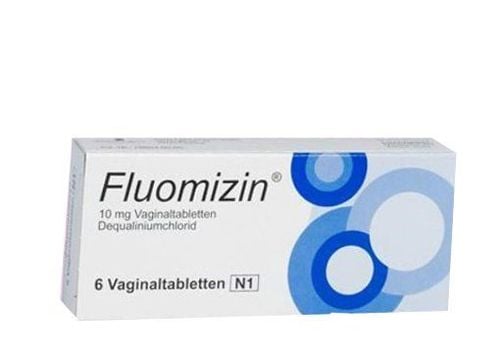This is an automatically translated article.
The article was professionally consulted by Doctor Hoang Thi Anh Tuyet - Department of Obstetrics and Gynecology - Vinmec Central Park International General Hospital.Vaginal yeast infection is a common disease in women, but in fact, many people are subjective and confuse this disease with many other gynecological diseases, leading to consequences without timely treatment.
1. What is a vaginal yeast infection?
A woman's vagina usually contains a healthy balance of bacteria and yeast. The hormone estrogen helps bacteria called lactobacilli grow. These bacteria work to kill harmful organisms and keep the vagina healthy. But when that balance is disturbed, a fungus called candida can grow out of control and cause a yeast infection. Vaginal yeast infection (vaginal candidiasis) is an overgrowth of the fungus Candida albicans. This overgrowth causes irritation, inflammation, itching, discharge, and burning pain. In fact, up to 75% of women will experience at least one yeast infection in their lifetime.Vaginal yeast infection is not a sexually transmitted disease. But there is a risk that a vaginal yeast infection can begin with sexual activity. Some studies also suggest that yeast infections may be linked to oral sex.
Vaginal yeast infections can be treated with drugs, but how fast or slow the treatment of vaginal yeast infections or relapses depends on the treatment process as well as the type of treatment you use.
Trắc nghiệm: Bạn có hiểu rõ về quá trình sinh con?
Mang thai và sinh con là một giai đoạn quan trọng có quyết định rất lớn đến sức khỏe của người mẹ và em bé sau này. Các câu hỏi trắc nghiệm dưới đây sẽ giúp bạn hiểu rõ hơn về quá trình sinh con.
Bài dịch từ: webmd.com
2. Symptoms of vaginal yeast infection
Itching and discomfort are typical symptoms of a vaginal yeast infection. In addition to the above symptoms, you may also experience any or all of the following:Hot, red, and swollen vagina and vulva (outer part of the female genitals) Pain or burning when you walk urinating Pain during sex Vaginal discharge thick, white, odorless. Vaginal discharge is abundant. If you experience the above symptoms, you should see a specialist for examination and treatment.
Symptoms of a yeast infection are similar to other serious conditions, including sexually transmitted infections and bacterial vaginosis (bacterial vaginosis is an overgrowth of bacteria in the lips). vaginal field). An accurate diagnosis is important for the best possible treatment.

3. Causes of vaginal yeast infections
Candida albicans is the most common cause of vaginal yeast infections. Yeast infections caused by other types of candida can be more difficult to treat and often require more intensive therapies.There are many reasons why you might get a vaginal yeast infection, including:
Hormonal changes: Changes during pregnancy, lactation or menopause (or if you take birth control pills) can change balance in your vagina. Diabetes: If your diabetes is not well controlled, an increase in the amount of sugar in the mucous membrane (moist lining) of the vagina can create a place for yeast to grow. Antibiotics: These drugs can kill many types of beneficial bacteria that live in your vagina. Douching and using vaginal sprays: Using these products can change the balance in your vagina. Weakened Immune System: If you are HIV-positive or have another immune system disorder, it is also possible for vaginal yeast to grow uncontrollably. Sex: Although a vaginal yeast infection is not considered a sexually transmitted infection, it can still be passed from one person to another through sexual contact.
4. When to see a doctor?
You need to see a doctor right away if:This is the first time you have symptoms of a vaginal yeast infection You are not sure if you have a vaginal yeast infection Your symptoms do not improve after treatment with topical medications or medications put antifungal medication (over-the-counter medicine) Additional symptoms appear.
5. Treatment for vaginal yeast infection
Treatment for a vaginal yeast infection depends on the severity and frequency of the infection.For mild to moderate symptoms and infrequent episodes, your doctor may recommend over-the-counter antifungal creams, ointments, or suppositories (containing miconazole or clotrimazole) which are the most common. for the treatment of yeast infections. Usually, the patient needs to take the drug within 1-7 days. Your doctor may also prescribe a single-dose oral supplement with fluconazole (an antifungal medicine). If you are pregnant, it is safe to use topical creams or suppositories, but avoid oral fluconazole.
If the treatment does not give good results or relapses many times, you need to go back to the doctor. If your symptoms are more severe or you have frequent yeast infections, your doctor may recommend:
Long-term treatment: Your doctor may prescribe an antifungal medication to be used daily for up to two weeks, then once a week for six months. Multi-dose oral medications: Your doctor may prescribe two or three doses of an oral antifungal instead of a topical medication. However, this method is not recommended for pregnant women. Anti-Azole Therapy: A pill you put into your vagina. This medication can be fatal if taken by mouth and is only used to treat candida that is resistant to common antifungal medications.
6. How to prevent vaginal yeast infections?
To reduce the risk of vaginal yeast infections, you should use underwear with a cotton crotch and not wear pants that are too tight. You should:Avoid wearing tight pants Avoid douching: this will remove some of the normal bacteria in the vagina and protect you from fungal infections Choose safe bathing products like soap, tampons birth and tampons. Don't take a bath that's too hot. Don't use antibiotics when you don't need them, such as a cold or a viral infection. Wet clothing, such as swimwear and workout wear, should not be worn for long periods of time. Vaginal yeast infections can be completely cured by using the right medication in combination with maintaining good hygiene and controlling the risk factors that increase the likelihood of vaginal yeast infection.
Vaginal yeast infection is not a very dangerous disease, but if it is not examined and treated early, it can leave many complications, affecting fertility later on.

Please dial HOTLINE for more information or register for an appointment HERE. Download MyVinmec app to make appointments faster and to manage your bookings easily.













